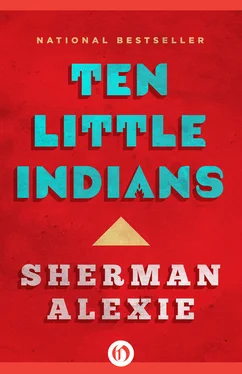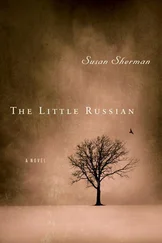“Yes, I am,” she said. “And weirdness is hereditary.”
“I’m weird, too,” Harrison said. “So you got it coming from both sides. You don’t have a chance.”
“I can’t believe you’re my parents. Did you adopt me?”
“Honey, we certainly did not adopt you,” Helen said. “We stole you from a pack of wolves, so eat your meat, you darling little carnivore.”
Laughing, feeling like an adult because his parents treated him with respect and satire, Frank sat between his mother and father and almost cried with happiness. His chest tightened, and his mouth tasted bitter. He cried too easily, he knew, and sometimes had to fight school-yard bullies who teased him about his quick tears. He usually won the fights and usually cried about his victory.
Sitting with his parents, Frank closed his eyes against his tears, blinked and blinked and thought of the utter hilarity of a dog farting in its sleep, and that made him laugh a little. Soon enough, he felt normal, like a kid made of steel and oak, and he could breathe easily, and he quickly ate his lunch of Kentucky Fried Chicken, but only wings and legs.
“Okay, I’m done,” he said. “Let’s play ball, Dad.”
“I’m too tired,” Harrison said. “I’m going to lie down in the grass and fall asleep in some dog poop.”
His father was always trying to be funny. He was funny sometimes, maybe most of the time, but nobody could be funny all of the time. And being funny was sometimes a way of being dishonest.
A few years back, Harrison had told Frank’s third-grade teacher that Indians didn’t believe in using numbers, that the science of mathematics was a colonial evil.
“Well,” the mystified teacher had asked, “then how do Indians count?”
“We guess,” Harrison had said with as much profundity as he could fake.
Okay, so maybe Harrison was funny because funny was valuable. Maybe being funny was usually a way of being honest.
“Come on, let’s play ball,” Frank pleaded with his father, who had flopped onto the grass with a chicken leg and a banana.
“I’m going to eat and sleep and fart,” Harrison said.
“Dad, you said you’d show me something new.”
“Did I promise you I would show you something new?”
“Well, no.”
“Did I sign something that said I would show you something new?”
“No.”
“That means we don’t have an oral or written contract. We don’t have an implied contract, either, because you don’t even know how to spell ‘implication.’ So that means I’m going to eat chicken until I pass out from a grease overdose.”
“Mom, he’s talking like a lawyer again.”
“Yeah,” she said. “I hate it when he does that.”
“And I can, too, spell ‘implication,’” Frank said.
“Okay,” Harrison said. “If you can spell ‘implication,’ your mother will play ball with you.”
“I don’t want to play ball with Mom, I want to play with somebody good.”
“Hey, your mom is great. Why do you think I fell in love with her?”
“Mom, he’s lying again.”
“I’m not lying. Our dear Helen was a cannibal on the basketball court.”
“Is that true, Mom?”
“I used to play,” she said.
Frank looked at his mother. Sure, she was tall (five feet eight or so, the same height as Harrison), and she was strong (she grew up bucking hay bales), but Frank had never seen her touch a basketball except to toss it in a closet or down the stairs or into a room or out the door, or anywhere to get that dang thing out of her way.
“Mom, are you lying?”
“Have I ever lied to you?”
“You told me I was raised by wolves.”
“Okay, have I ever lied to you twice in one day?”
“Mom, be serious.”
“She is being serious,” Harrison said. “She used to play those girls’ rules. Three girls on defense, three on offense. Your mom was the shooter. Damn, I saw her score fifty-two points once. And then the coaches decided to play boys’ rules. They didn’t have to, but they wanted to see what your mom could do in a real game. And she scored seventy-three. I missed that one. If I’d seen that game, I would have proposed to her on the spot.”
“I love you, too, sweetie,” Helen said to her husband.
Frank couldn’t believe it. He looked at his mother in her denim skirt and frilly blue top, with her lipstick and her beaded earrings and her scarf all matching perfectly, all of her life and spirit and world color-coordinated and alphabetically organized. How could his mother, who washed her hands twelve times a day, ever have played a game so fundamentally sweaty and messy?
“Mom, did you really play ball?”
“It was girls’ basketball,” she said, “so it doesn’t really count.”
She was being sarcastic, Frank knew, because she’d taught him how to be sarcastic.
“For the rest of your academic life,” she’d told him on his first day of kindergarten, “whenever any teacher tells you that Columbus discovered America, I want you to run up to him or her, jump on his or her back, and scream, ‘I discovered you!’”
He’d never been courageous enough to do it, but he always considered it. He always almost did it. He almost always ran home and told Helen how close he’d been to doing it, how he was sure he could do it the next time, and she hugged him and told him how smart and good and handsome he was. Helen was loving and crazy and unpredictable and gentle and voluble and bitter and funny and a thousand other good and bad and indefinable things, but she was certainly not a liar.
“Are you telling the truth?” Frank asked her. “Were you really a good basketball player?”
“People said I was good,” she said and shrugged. “If enough people say you’re good at something, then you’re probably good at it.”
“Okay, cool,” Frank said. “Do you want to play ball with me?”
“Remember, you have to spell ‘implication’ first,” Harrison.
“It’s spelled ‘D-A-D I-S A J-E-R-K,’” Frank said.
All three of them laughed. They were always laughing. That was what people said about the Snake Churches. People said the Snake Churches were good at laughing.
“Okay, okay,” Helen said. “Let’s play ball. But I’m not making any guarantees. It’s been a long time.”
So mother and son took to the court and played basketball. At first, she practiced shots while he rebounded her makes and misses and passed the ball back to her. She had a funny shot, a one-handed push, and she missed the first ten or twelve before her body remembered the game, and then she rarely missed. From ten feet away, then fifteen, then twenty, and twenty-five feet, she shot and made it and shot and made it and shot and made it and shot and missed it and then shot and made it and shot and made it and shot many times and made many more than she missed.
“Wow,” Frank said to his mother as she shot. He kept saying it. It was all he could think to say. This was a new ceremony for them, for this mother and son. They’d created and shared other ceremonies. They baked cookies together; they told stories to each other at night; they made up love songs while she drove him to school; they gave silly nicknames to strangers in shopping malls; they made up stupid knock-knock jokes and laughed until milk sprayed out of their noses. But they’d never played a sport together, had never been this physical, this strong and competitive. Frank looked at his mother, and he saw a new woman, a different person, a mysterious stranger, and a romantic figure.
“Mom,” Frank said. “You’re a ballplayer.”
Oh man, he loved her, and he felt like crying yet again. Oh, he was young and worshipful and sentimental, and he didn’t know it, but his mother would always want her son to be young and worshipful and sentimental. She prayed that the world, filled with its cruel people and cruder philosophies, would not punish her son too harshly for being so kind and so receptive to kindness.
Читать дальше












